Quality Criteria to Evaluate Performance and Scope of 2030 Agenda in Metropolitan Areas: Case Study on Strategic Planning of Environmental Municipality Management
Abstract
1. Introduction
2. Framework
2.1. The Agenda 2030 as Planning and Action Frameworks
- A new global science is needed for the urban era: there is a need to develop an ‘urban science’, not as a single science, but as a cross-cutting field of engagement across multiple disciplines;
- Urban science needs a broad range of experts and information: the urban science community will need to include a wide range of experts, including non-academic actors such as Non-Governmental Organizations (NGOs), residents, consultancies, industry, international organizations, city networks, and the scholarly edifice of academic research;
- An urbanizing planet calls upon the sciences and policymaking to rethink and enhance their relationship across complex systems: the pathways to reform and improvement of the role of science in the future of cities goes, inevitably, through multiple sectors and scales of governance.
2.2. Strategic Planning in Local Management
2.3. Environmental Evaluation as a Participation and Planning Tool
3. Materials and Methods
3.1. Methodological Framework
- Suitability of the information collection instruments used and of their quality.
- Strengths of the model.
- Weaknesses of the model.
- Contribution of the model for the development of sustainable local management.
- Feasibility and transfer possibilities to other contexts.
3.2. Instruments for Data Collection
3.3. Context, Sample and Agents
3.4. Analysis Procedure
4. Results
4.1. Citizen Opinion Questionnaire
4.2. Monitoring Commission
4.3. Discussion Groups
4.4. Citizen Participation Forum
4.5. Letters to the Council Representatives
5. Discussion
- (a)
- Methodological reflection on the model: 1. The design and implementation of the participatory strategies presented in this study enabled us to collect information on the citizen’s perception of the environmental and social problems existing in the municipality studied, as well as possible proposals for improvement. 2. Foster the participation of the population in decision-making related to local management in the environmental field. 3. Promote a process of personal and collective self-reflection that favours addressing any doubts and assumptions of responsibilities by the population in the process of developing a participatory local environmental management model endorsed by the principles of 2030A.
- (b)
- Strengths of the validated management model: 1. Allows gathering of broad perceptions of the population, facilitating the participation of all citizens in the process. 2. Facilitates initial contact with the population in order to consolidate much more complex structures of citizen participation. 3. Systematizes and structures procedures for collecting information that encourage citizen participation in municipal management. 4. Provides a formula for collective and individual reflection of the citizen in relation to their behaviours and attitudes within the global municipal structure. 5. Facilitates the knowledge of the premises of the 2030A and its application by the neighborhood. 6. Favours the involvement of all those most representative in the municipality.
- (c)
- Weaknesses: 1. Difficulty in ensuring the representativeness of the entire population and that the demands described are really those that exist and not just a reflection of individual issues. 2. Political opportunism conceived as occasional strategies of a circumstantial nature that are intended to merely meet political and economic targets from specific subsidies. 3. Risk of becoming decontextualized and discontinuous actions that do not facilitate results in the medium or long-term. 4. Lack of motivation and trust in these types of structures by the population, including political groups and the municipal technical group. 5. Compliance with expectations.
- (d)
- Contribution to Participatory Municipal Management and feasibility of application to other contexts: Among the contributions of the municipal management model we supported in this study, and which can serve as a reference and be suitable for application in other contexts, we highlight the following: 1. Provides information for contextualized management. 2. Gives ground to the political and local management actions carried out, which enables a relevant degree of success and effectiveness. 3. Introduces the population to innovative processes of citizen participation and local development. 4. Consolidates reflective processes and continuous training in the development of sustainable actions. 5. Promotes the involvement of representative social sectors in the municipality in the decision-making process of municipal management.
6. Conclusions
Author Contributions
Funding
Conflicts of Interest
References
- Acuto, M.; Parnell, S.; Seto, K.C. Building a global urban science. Nat. Sustain. 2018, 1, 2. [Google Scholar] [CrossRef]
- Batty, M. The New Science of Cities; The MIT Press: Cambridge, MA, USA, 2013. [Google Scholar]
- Bai, X.; Elmqvist, T.; Frantzeskaki, N.; McPhearson, T.; Simon, D.; Maddox, D.; Watkins, M.; Romero-Lankao, P.; Parnell, S.; Griffith, C.; et al. New Integrated Urban Knowledge for the Cities We Want. In Urban Planet: Knowledge towards Sustainable Cities; Bai, T., Frantzeskaki, N., Griffith, C., Maddox, D., McPhearson, T., Eds.; Cambridge University Press: Cambridge, MA, USA, 2018; pp. 462–482. [Google Scholar]
- Wachsmuth, D.; Cohen, D.A.; Angelo, H. Expand the frontiers of urban sustainability. Nat. News 2016, 536, 391. [Google Scholar] [CrossRef] [PubMed]
- Barnett, C.; Parnell, S. Ideas, Implementation and Indicators: Epistemologies of the post-2015 Urban Agenda. Environ. Urban. 2016, 28, 87–98. [Google Scholar] [CrossRef]
- Elmqvist, T.; Bai, X.; Frantzeskaki, N.; Griffith, C.; Maddox, D.; McPhearson, T.; Parnell, S.; Romero-Lankao, P.; Simon, D.; Watkins, M. The Urban Planet: Knowledge Towards Sustainable Cities; Cambridge University Press: Cambridge, MA, USA, 2018. [Google Scholar]
- Parnell, S. Globalization and Sustainable Development: At the Urban Crossroad. Eur. J. Dev. Res. 2018, 30, 169–171. [Google Scholar] [CrossRef]
- Smith, M.S.; Cook, C.; Sokona, Y.; Elmqvist, T.; Fukushi, K.; Broadgate, W.; Jarzebski, M.P. Advancing sustainability science for the SDGs. Sustain. Sci. 2018, 13, 1483–1487. [Google Scholar] [CrossRef]
- Nature Sustainability Network. Science and the Future of Cities. Report of the International Expert Panel on Science and the Future of Cities. 2018. Available online: http://sites.nationalacademies.org/cs/groups/depssite/documents/webpage/deps_191052.pdf (accessed on 7 January 2020).
- Dellas, E.; Schreiber, F. Follow-up and Review of the New Urban Agenda. Plan. Theory Pract. 2018, 19, 133–137. [Google Scholar]
- Birch, E. A Midterm Report: Will Habitat III Make a Difference to the World’s Urban Development? J. Am. Plan. Assoc. 2016, 82, 398–411. [Google Scholar] [CrossRef]
- Nilsson, M.; Chisholm, E.; Griggs, D.; Howden-Chapman, P.; McCollum, D.; Messerli, P.; Neumann, B.; Stevance, A.-S.; Visbeck, M.; Stafford-Smith, M. Mapping interactions between the sustainable development goals: Lessons learned and ways forward. Sustain. Sci. 2018, 13, 1489–1503. [Google Scholar] [CrossRef]
- Lafortune, G.; Schmidt-Traub, G. SDG Challenges in G20 Countries. Sustain. Dev. Goals 2019, 2, 219–234. [Google Scholar]
- Messerli, P.; Kim, E.M.; Lutz, W.; Moatti, J.-P.; Richardson, K.; Saidam, M.; Smith, D.; Eloundou-Enyegue, P.; Foli, E.; Glassman, A.; et al. Expansion of sustainability science needed for the SDGs. Nat. Sustain. 2019, 2, 892–894. [Google Scholar] [CrossRef]
- Greenwood, D.; Levin, M. Introduction to Action Research; SAGE Publications: Thousand Oaks, CA, USA, 2006. [Google Scholar]
- Nowotny, H.; Gibbons, M.; Scott, P. Re-Thinking Science: Knowledge and the Public in an Age of Uncertainty; Polity: Cambridge, MA, USA, 2001. [Google Scholar]
- Hirsch Hadorn, G.; Bradley, D.; Pohl, C.; Rist, S.; Wiesmann, U. Implications of transdisciplinarity for sustainability research. Ecol. Econ. 2006, 60, 119–128. [Google Scholar] [CrossRef]
- Adler, C.; Hadorn, G.H.; Breu, T.; Wiesmann, U.; Pohl, C. Conceptualizing the Transfer of Knowledge across Cases in Transdisciplinary Research. Sustain. Sci. 2018, 13, 179–190. [Google Scholar] [CrossRef] [PubMed]
- Funtowicz, S.; Ravetz, J.K. Post-Normal Science. In Companion to Environmental Studies; Castree, N., Hulme, M., Proctor, J.D., Eds.; Routledge: Abingdon, UK, 2018; pp. 443–447. [Google Scholar]
- Schneider, F.; Kläy, A.; Zimmermann, A.B.; Buser, T.; Ingalls, M.; Messerli, P. How can science support the 2030 Agenda for Sustainable Development? Four tasks to tackle the normative dimension of sustainability. Sustain. Sci. 2019, 14, 1593–1604. [Google Scholar] [CrossRef]
- Schinas, M. The EU in 2030: A long-term view of Europe in a changing world: Keeping the values, changing the attitudes. Eur. View 2012, 11, 267–275. [Google Scholar] [CrossRef]
- Destro, M. Planificación Estratégica participativa para la calidad y competitividad. 2000. Unpublished work. [Google Scholar]
- Charalabidis, Y.; Theocharopoulou, C. A Participative Method for Prioritizing Smart City Interventions in Medium-Sized Municipalities. Int. J. Public Adm. Digit. Age 2019, 6, 41–63. [Google Scholar] [CrossRef]
- Garcia-Ayllon, S. The Integrated Territorial Investment (ITI) of the Mar Menor as a model for the future in the comprehensive management of enclosed coastal seas. Ocean Coast. Manag. 2018, 166, 82–97. [Google Scholar] [CrossRef]
- García-Ayllón, S.; Tomás, A.; Ródenas, J.L. The Spatial Perspective in Post-Earthquake Evaluation to Improve Mitigation Strategies: Geostatistical Analysis of the Seismic Damage Applied to a Real Case Study. Appl. Sci. 2019, 9, 3182. [Google Scholar] [CrossRef]
- García-Ayllón, S. New Strategies to Improve Co-Management in Enclosed Coastal Seas and Wetlands Subjected to Complex Environments: Socio-Economic Analysis Applied to an International Recovery Success Case Study after an Environmental Crisis. Sustainability 2019, 11, 1039. [Google Scholar] [CrossRef]
- Chanchitpricha, C.; Morrison-Saunders, A.; Bond, A. Investigating the effectiveness of strategic environmental assessment in Thailand. Impact Assess. Proj. Apprais. 2019, 37, 356–368. [Google Scholar] [CrossRef]
- Santos, R.; Coelho, P.; Antunes, P.; Barros, T. Stakeholders Perspectives on the Use of Indicators in Water Resources Planning and Related Strategic Environmental Assessment. J. Environ. Assess. Policy Manag. 2019, 21, 1950001. [Google Scholar] [CrossRef]
- Hutton, C.W.; Nicholls, R.J.; Lázár, A.N.; Chapman, A.; Schaafsma, M.; Salehin, M. Potential Trade-Offs between the Sustainable Development Goals in Coastal Bangladesh. Sustainability 2018, 10, 1108. [Google Scholar] [CrossRef]
- Rodríguez-Olalla, A.; Avilés-Palacios, C. Integrating Sustainability in Organisations: An Activity-Based Sustainability Model. Sustainability 2017, 9, 1072. [Google Scholar] [CrossRef]
- Bowen, K.J.; Cradock-Henry, N.A.; Koch, F.; Patterson, J.; Häyhä, T.; Vogt, J.; Barbi, F. Implementing the “Sustainable Development Goals”: Towards addressing three key governance challenges—Collective action, trade-offs, and accountability. Curr. Opin. Environ. Sustain. 2017, 26, 90–96. [Google Scholar] [CrossRef]
- Olsson, L.; Jerneck, A. Social fields and natural systems: Integrating knowledge about society and nature. Ecol. Soc. 2018, 23, 26. [Google Scholar] [CrossRef]
- Sintes, M. A Importancia da Educación Ambiental no Eido Local. In Iniciativas Municipais de Educación Ambiental en Galicia; Fernáncez, L., Iglesias, L., Eds.; SGEA-Proyecto Fénix Xunta de Galicia-CEIDA: Coruña, Spain, 2010. [Google Scholar]
- Pozo-Llorente, M.T.; Gutiérrez-Pérez, J.; Poza-Vilches, M.F. Local Agenda 21 and Sustainable Development. In Encyclopedia of Sustainability in Higher Education; Leal Filho, W., Ed.; Springer: Cham, Switzerland, 2019. [Google Scholar]
- Benson, J. Knowledge and communication in democratic politics: Markets, forums and systems. Political Stud. 2019, 67, 422–439. [Google Scholar] [CrossRef]
- Copeland, P. A Trade-Off Analysis of the Normative Values of Deliberative Democracy. Ph.D. Thesis, University of Guelph, Department of Philosophy, Guelph, ON, Canada, 2019. [Google Scholar]
- Jarque, M.; Brugué, J. Planes estratégicos locales y redes participativas: Entre el discurso y la práctica. In Gobiernos Locales y Redes Participativas; Blanco, I., Gomà, R., Eds.; Ariel: Barcelona, Spain, 2002; pp. 43–63. [Google Scholar]
- Poza-Vilches, M.F.; Gutiérrez-Pérez, J.; López-Alcarria, A. Participation and Sustainable Development. In Encyclopedia of Sustainability in Higher Education; Leal Filho, W., Ed.; Springer: Cham, Switzerland, 2019. [Google Scholar]
- Rosanvallon, P. La Contrademocracia. La Política en la era de la Desconfianza; Ediciones Manantial SRL: Buenos Aires, Argentina, 2007. [Google Scholar]
- Bobbio, N. El Futuro de la Democracia; Fondo de Cultura Económica: México City, Mexico, 1986. [Google Scholar]
- Cardona-Zuleta, L.M.; Roll, D. Participación, partidos y liderazgo político. Entre la desafección y la esperanza. Forum. Rev. Dep. Ciencia Política 2019, 16, 7–12. [Google Scholar]
- Cheresky, I. Poder Presidencial, Opinión Pública y Exclusión Social; Ediciones Manantial SRL: Buenos Aires, Argentina, 2008. [Google Scholar]
- Müller, U.; Lude, A.; Hancock, D.R. Leading Schools towards Sustainability. Fields of Action and Management Strategies for Principals. Preprints 2019. [Google Scholar] [CrossRef]
- Trilaksono, T.; Purusottama, A.; Misbach, I.H.; Prasetya, I.H. Leadership Change Design: A Professional Learning Community (PLC) Project in Eastern Indonesia. Int. J. Eval. Res. Educ. 2019, 8, 47–56. [Google Scholar] [CrossRef]
- Rüeg-Stürm, J. The New St. Gallen Management Model. Basic Categories of an Approach to Integrated Management; Springer: London, UK, 2004. [Google Scholar] [CrossRef]
- Font, J. Participación Ciudadana: Una Panorámica de Nuevos Mecanismos Participativos. In Papers de la Fundació; N. 128; Fundació Rafael Campalans: Barcelona, Spain, 2001. [Google Scholar]
- Gutiérrez, J. El proceso de investigación cualitativa desde el enfoque interpretativo y de la investigación acción. In Modelos de Análisis de la Investigación Educativa; En Buendía, L., González, D., Gutiérrez, J., Pegalajar, M., Eds.; Alfar: Sevilla, Spain, 1999; pp. 7–60. [Google Scholar]
- Thérivel, R.; Partidário, M.R. The Practice of Strategic Environmental Assessment; Earthscan Publications: London, UK, 1996. [Google Scholar]
- Thérivel, R. Strategic Environmental Assessment in Action; Routledge: London, UK, 2012. [Google Scholar]
- Clark, R. Making EIA count in decision-making. In Perspectives on Strategic Environmental Assessment; Partidário, M.R., Clark, R., Eds.; Lewis Publishers: Boca Raton, FL, USA, 2000; pp. 15–28. [Google Scholar]
- Oñate, J.J.; Jerez, D.P.; Cardona, F.S.; Mesa, J.C.; Rodriguez, J.J. Evaluación Ambiental Estratégica. La Evaluación Ambiental de Políticas, Planes y Programas; Ediciones Mundi—Prensa: Madrid, Spain, 2002. [Google Scholar]
- Wu, Y.-Y.; Ma, H.-W. Challenges for Integrating Strategic Environmental Assessment to Enhance Environmental Thinking: A Case Study of Taiwan Energy Policy. Sustainability 2019, 11, 609. [Google Scholar] [CrossRef]
- Simon, D.; Arfvidsson, H.; Anand, G.; Bazaz, A.; Fenna, G.; Foster, K.; Jain, J.; Hansson, S.; Marix Evans, L.; Moodley, N.; et al. Developing and testing the Urban Sustainable Development Goal’s targets and indicators—A five-city study. Environ. Urban. 2016, 28, 49–63. [Google Scholar] [CrossRef]
- Pohl, C. From science to policy through transdisciplinary research. Environ. Sci. Policy 2008, 11, 46–53. [Google Scholar] [CrossRef]
- Fraser, E.D.G.; Dougill, A.J.; Mabee, W.E.; Reed, M.; McAlpine, P. Botton-up or Top-down: Analysis of participatory processes for sustainable indicator identification as a pathway to community empowerment and sustainable environmental management. J. Environ. Manag. 2006, 78, 114–127. [Google Scholar] [CrossRef] [PubMed]
- Knapp, C.N.; Reid, R.S.; Fernández-Giménez, M.E.; Klein, J.A.; Galvin, K.A. Placing Transdisciplinarity in Context: A Review of Approaches to Connect Scholars, Society and Action. Sustainability 2019, 11, 4899. [Google Scholar] [CrossRef]
- Termeer, C.; Dewulf, A.; Biesbroek, R. A critical assessment of the wicked problem concept: Relevance and usefulness for policy science and practice. Policy Soc. 2019, 38, 167–179. [Google Scholar] [CrossRef]
- Head, B.W. Forty years of wicked problems literature. Policy Soc. 2019, 38, 180–197. [Google Scholar] [CrossRef]
- Gibbons, M. The New Production of Knowledge: The Dynamics of Science and Research in Contemporary Societies; SAGE: London, UK, 2010. [Google Scholar]
- Wallerstein, N. Community-Based Participatory Research for Health: Advancing Social and Health Equity, 3rd ed.; John Wiley & Sons: Hoboken, NJ, USA, 2017. [Google Scholar]
- Binet, A.; Vedette, G.; Leigh, C.; Mariana, A. Designing and Facilitating Collaborative Research Design and Data Analysis Workshops: Lessons Learned in the Healthy Neighborhoods Study. Int. J. Environ. Res. Public Health 2019, 16, 324. [Google Scholar] [CrossRef]
- Oble, B.F.; Storey, K. Towards a structured approach to strategic environmental assessment. J. Environ. Assess. Policy Manag. 2001, 3, 483–508. [Google Scholar]
- Gutiérrez, J.; Poza, M.F. Instrumentos de evaluación comunes en las redes municipales europeas: El necesario protagonismo de los indicadores de educación ambiental en la sostenibilidad local. In Estratexias de Educación Ambiental: Modelos, Experiencias e Indicadores para a Sostenibilidade Local; Iglesias, L., Ed.; Eixo Atlántico: Vigo, Spain, 2008; pp. 83–128. [Google Scholar]
- Rodríguez, C.; Gutiérrez, J.; Pozo, T. Fundamentos Conceptuales y Desarrollo Práctico con SPSS de las Principales Pruebas de Significación Estadística en el Ámbito Educativo; Grupo Editorial Universitario: Granada, Spain, 2007. [Google Scholar]
- Guba, E.G.; Lincoln, Y.S. Effective Evaluation: Improving the Usefulness of Evaluation Results through Responsive and Naturalistic Approaches; Jossey-Bass: San Francisco, CA, USA, 1991. [Google Scholar]
- Poza-Vilches, F.; López-Alcarria, A.; Mazuecos-Ciarra, N. A Professional Competences’ Diagnosis in Education for Sustainability: A Case Study from the Standpoint of the Education Guidance Service (EGS) in the Spanish Context. Sustainability 2019, 11, 1568. [Google Scholar] [CrossRef]
- García, E.; Gil, J.; Rodríguez, G. Análisis Factorial; La Muralla: Madrid, Spain, 2000. [Google Scholar]
- Comrey, A.L. A method for removing outliers to improve factor analytic results. Multivar. Behav. Res. 1985, 20, 273–281. [Google Scholar] [CrossRef]
- Bisquerra, R. Introducción Conceptual al Análisis Multivariable; PPU: Barcelona, Spain, 1989; Volume II. [Google Scholar]
- Shao, Q.; Weng, S.S.; Liou, J.J.H.; Lo, H.W.; Jiang, H. Developing A Sustainable Urban-Environmental Quality Evaluation System in China Based on A Hybrid Model. Int. J. Environ. Res. Public Health 2019, 16, 1434. [Google Scholar] [CrossRef] [PubMed]
- Aldegheishem, A. Success factors of smart cities: A systematic review of literature from 2000–2018. J. Land Use Mobil. Environ. 2019, 12, 53–64. [Google Scholar]
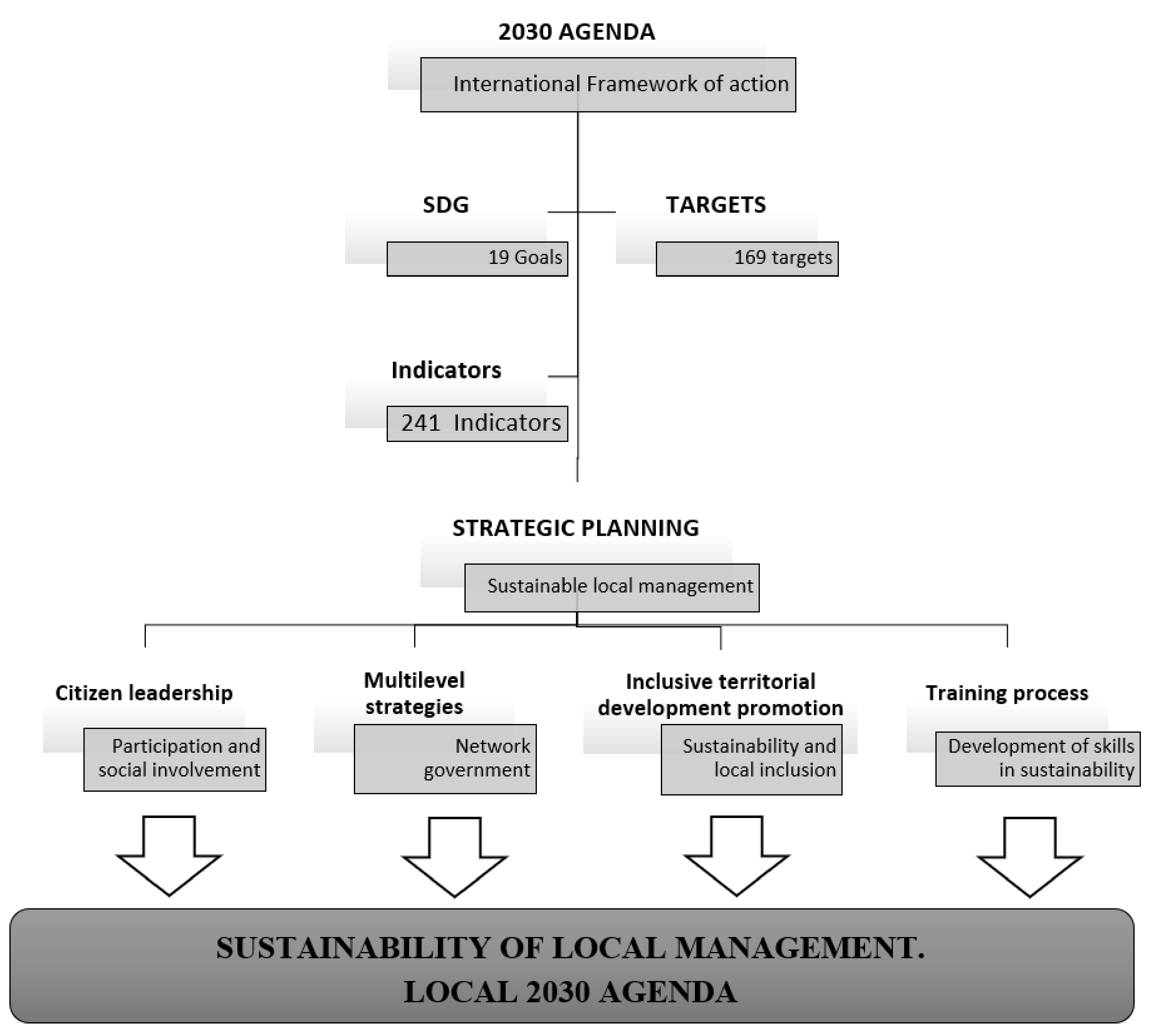
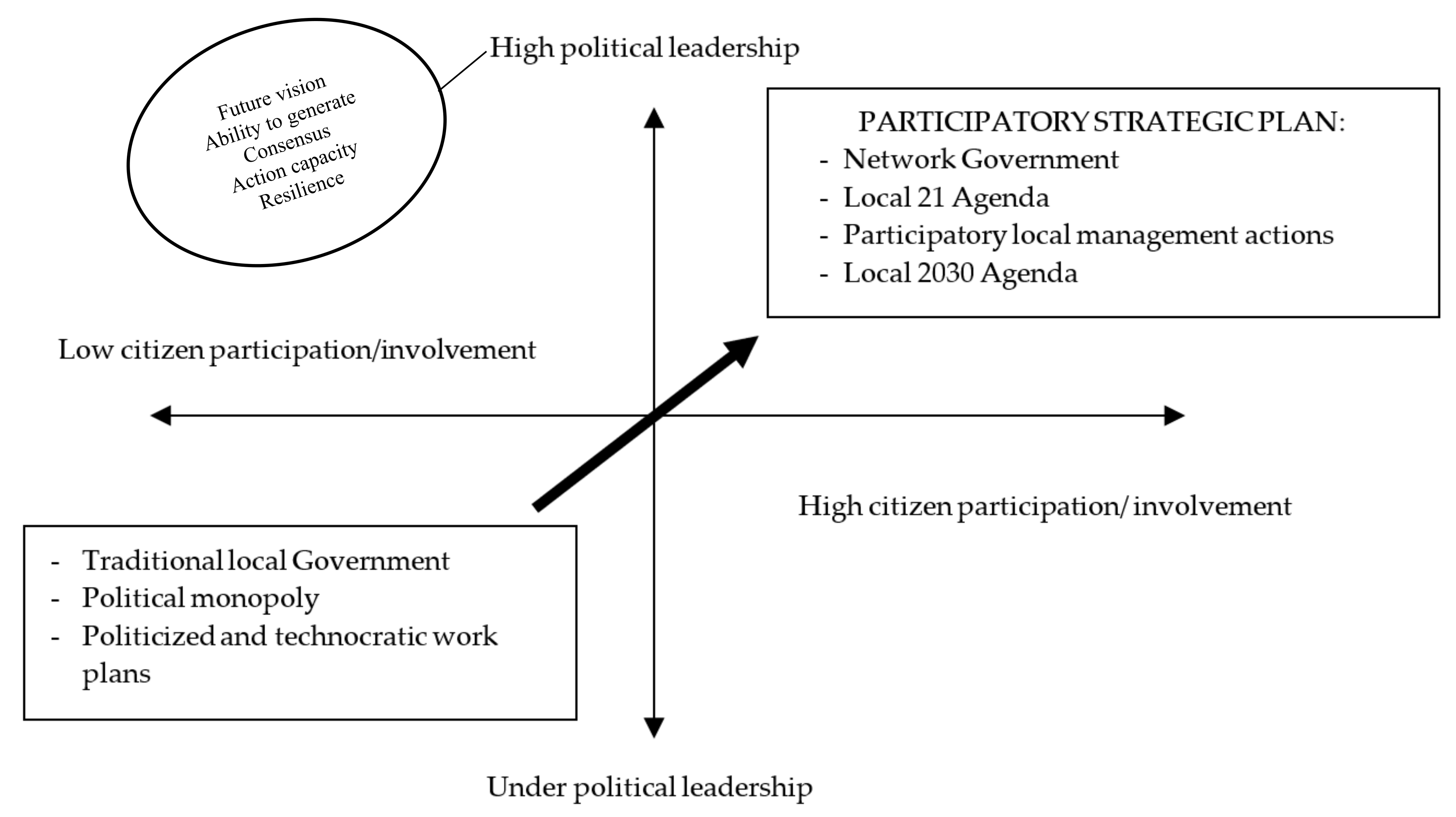
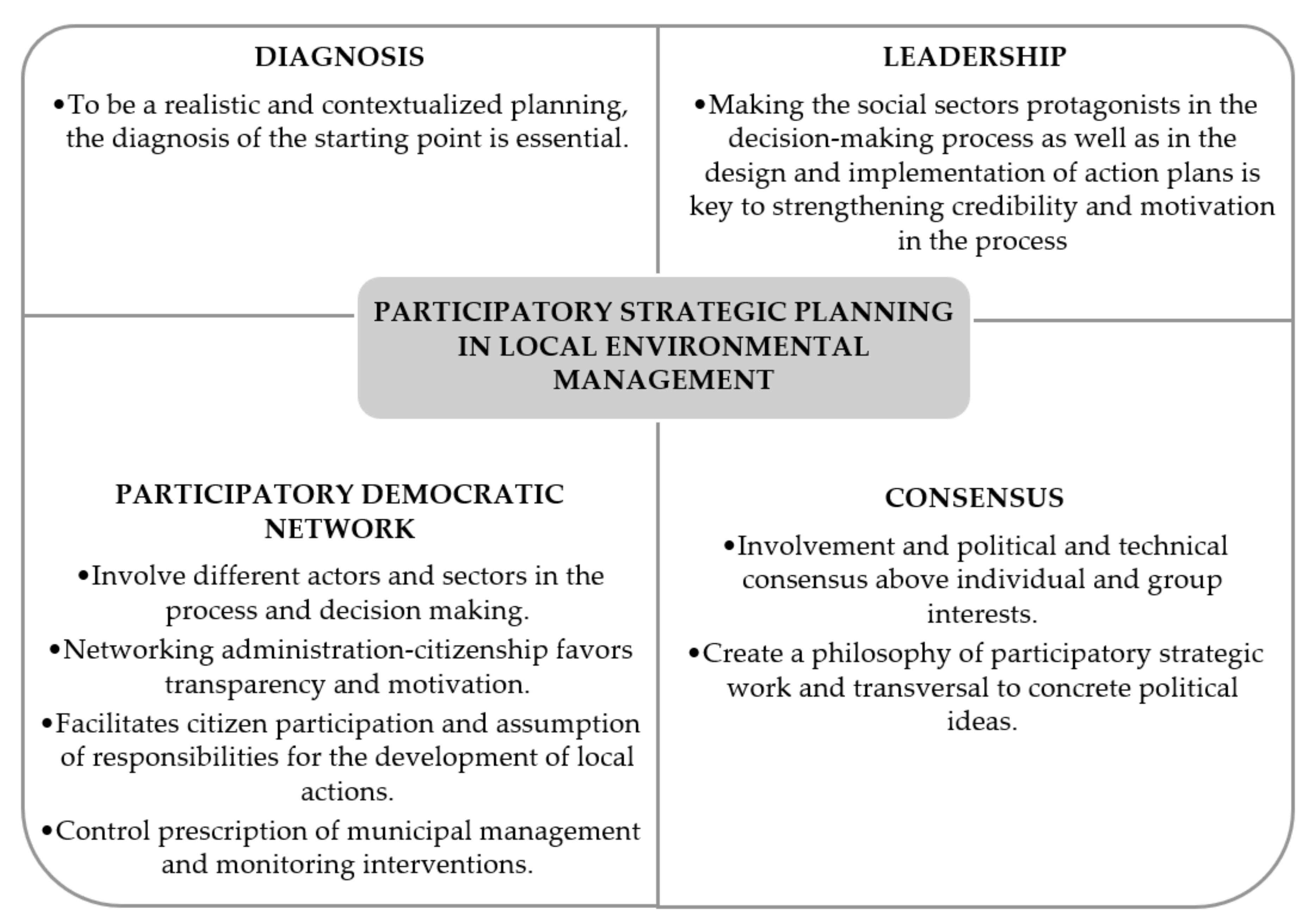
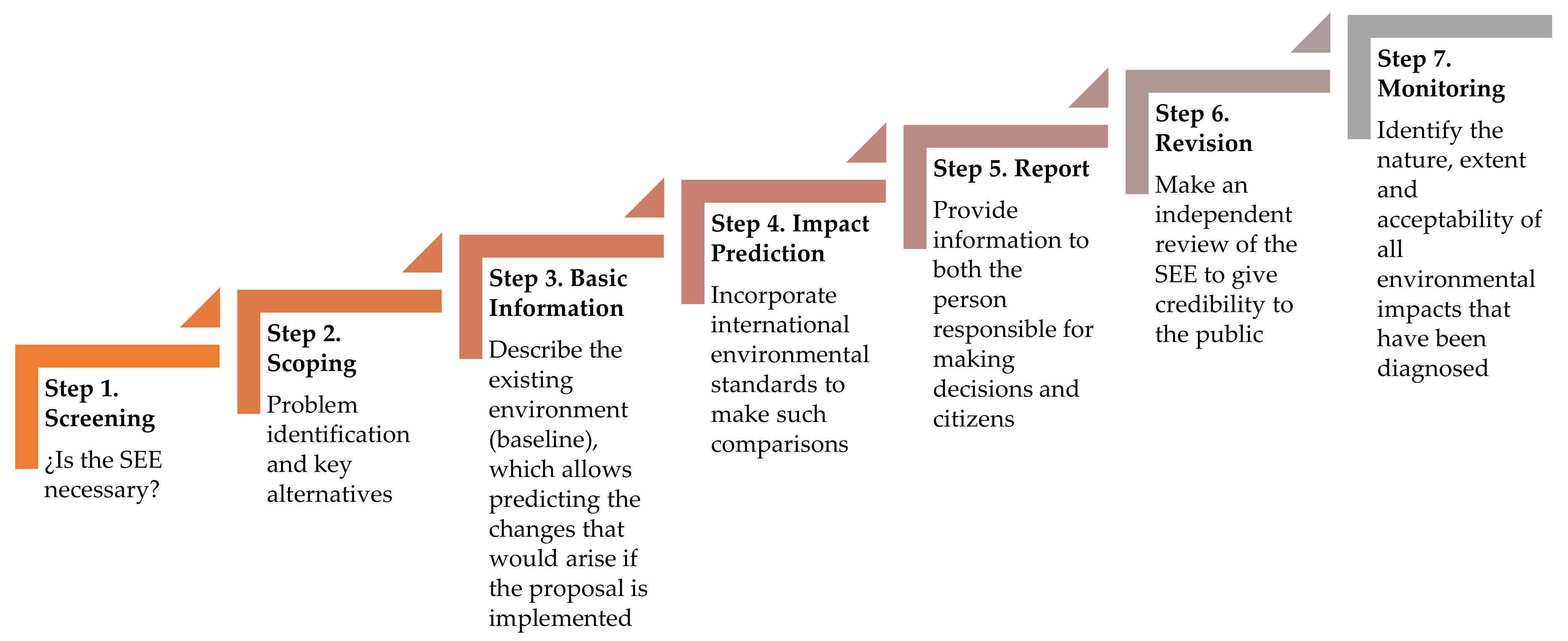
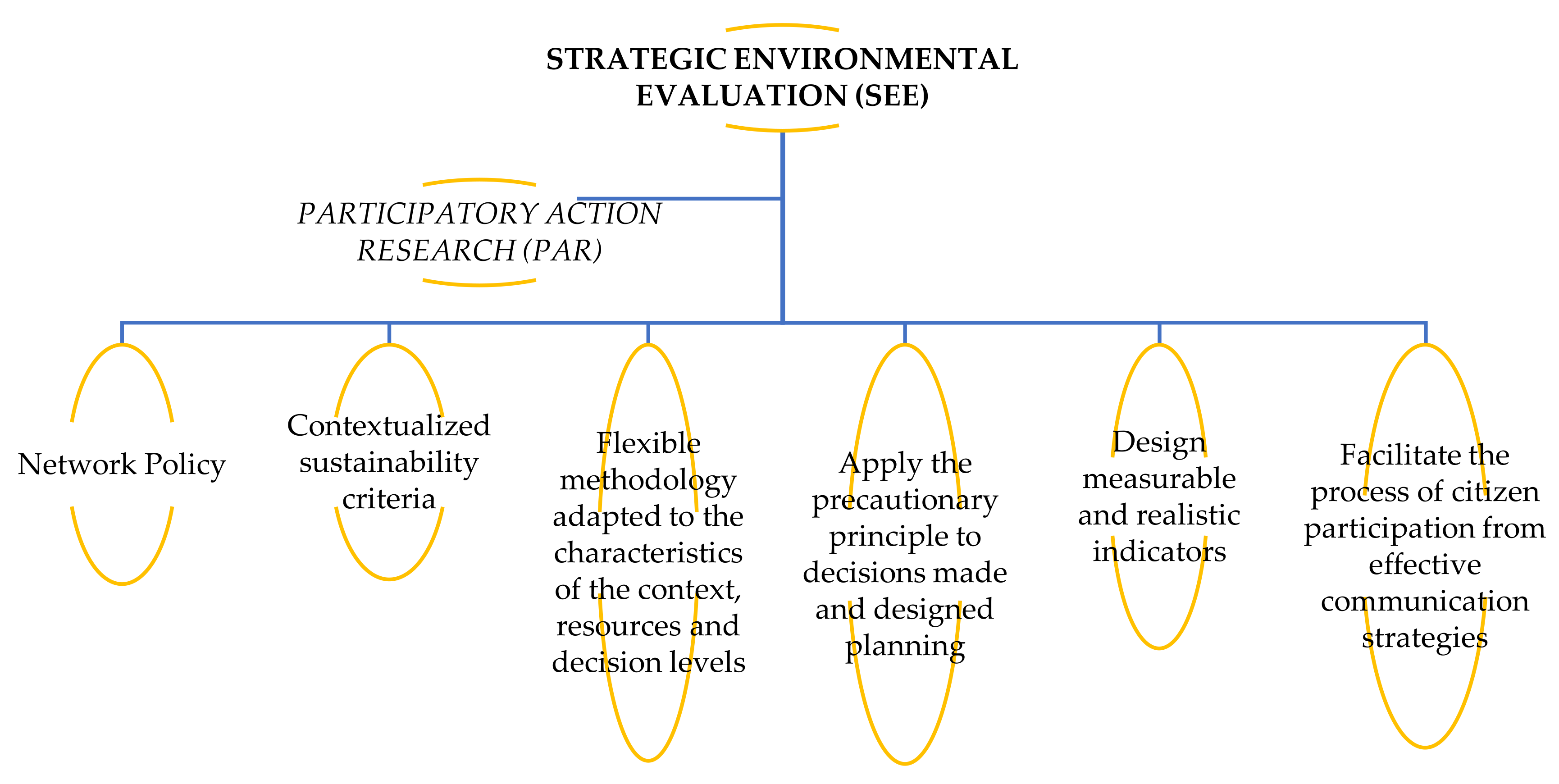
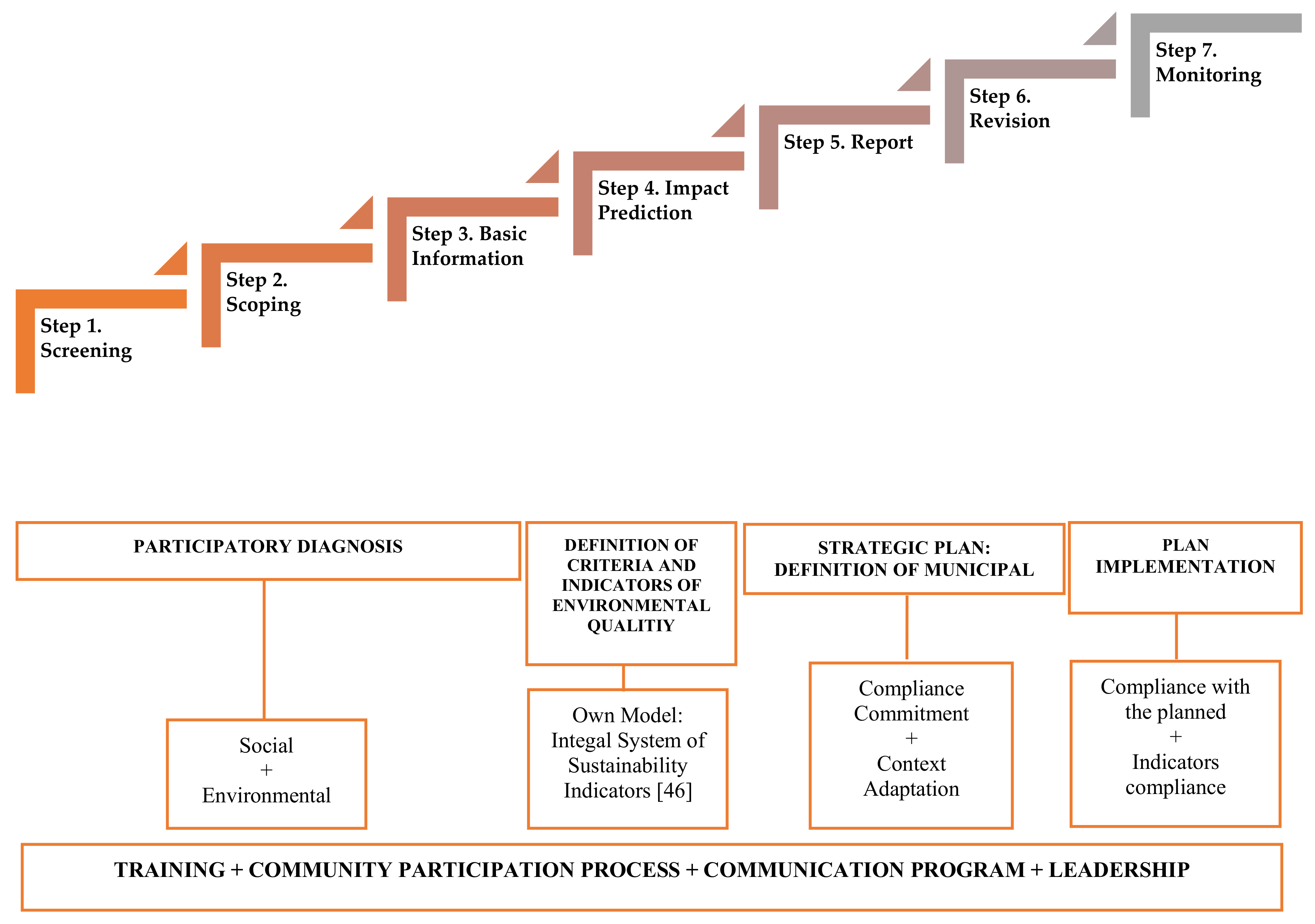
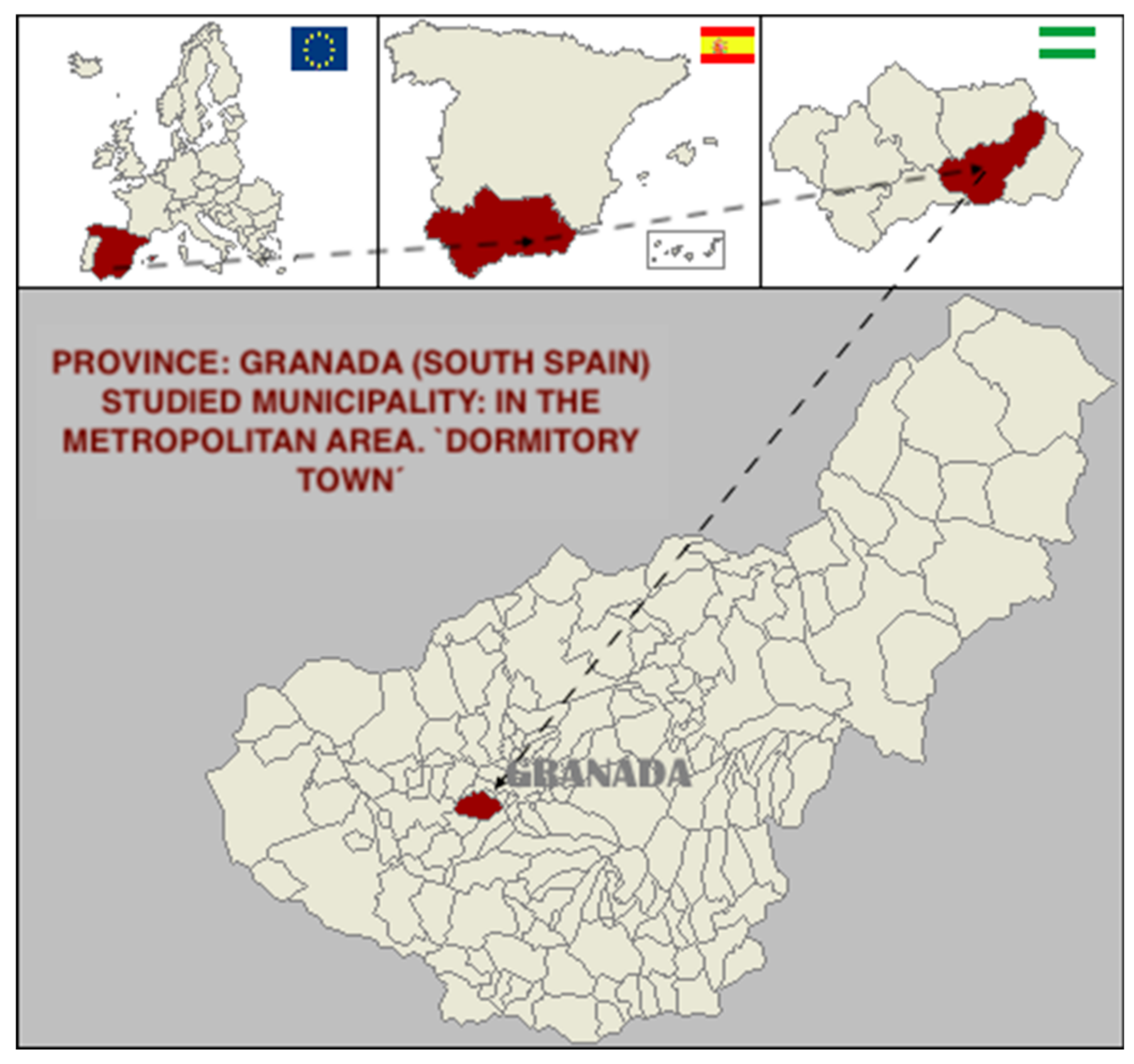
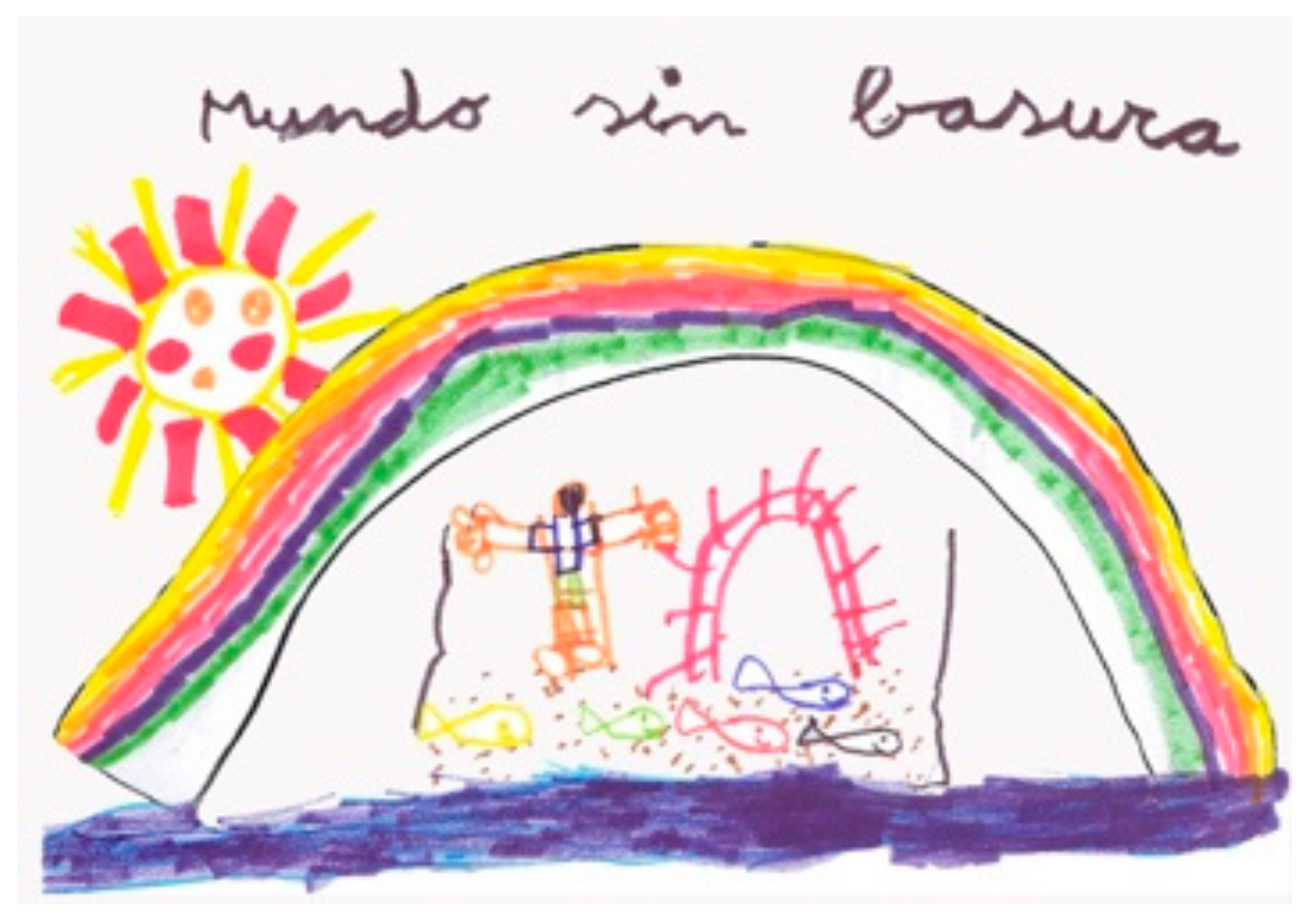
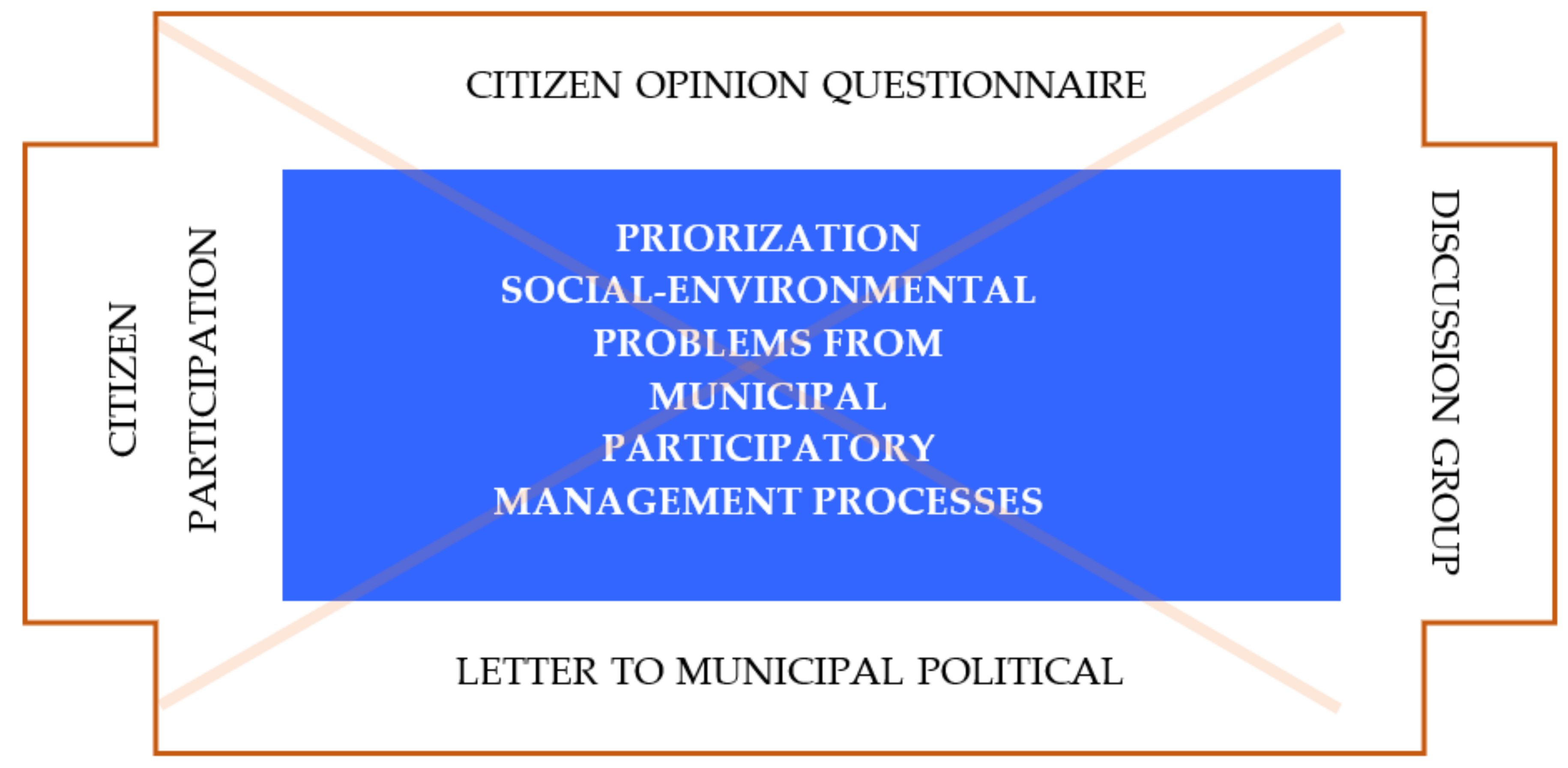
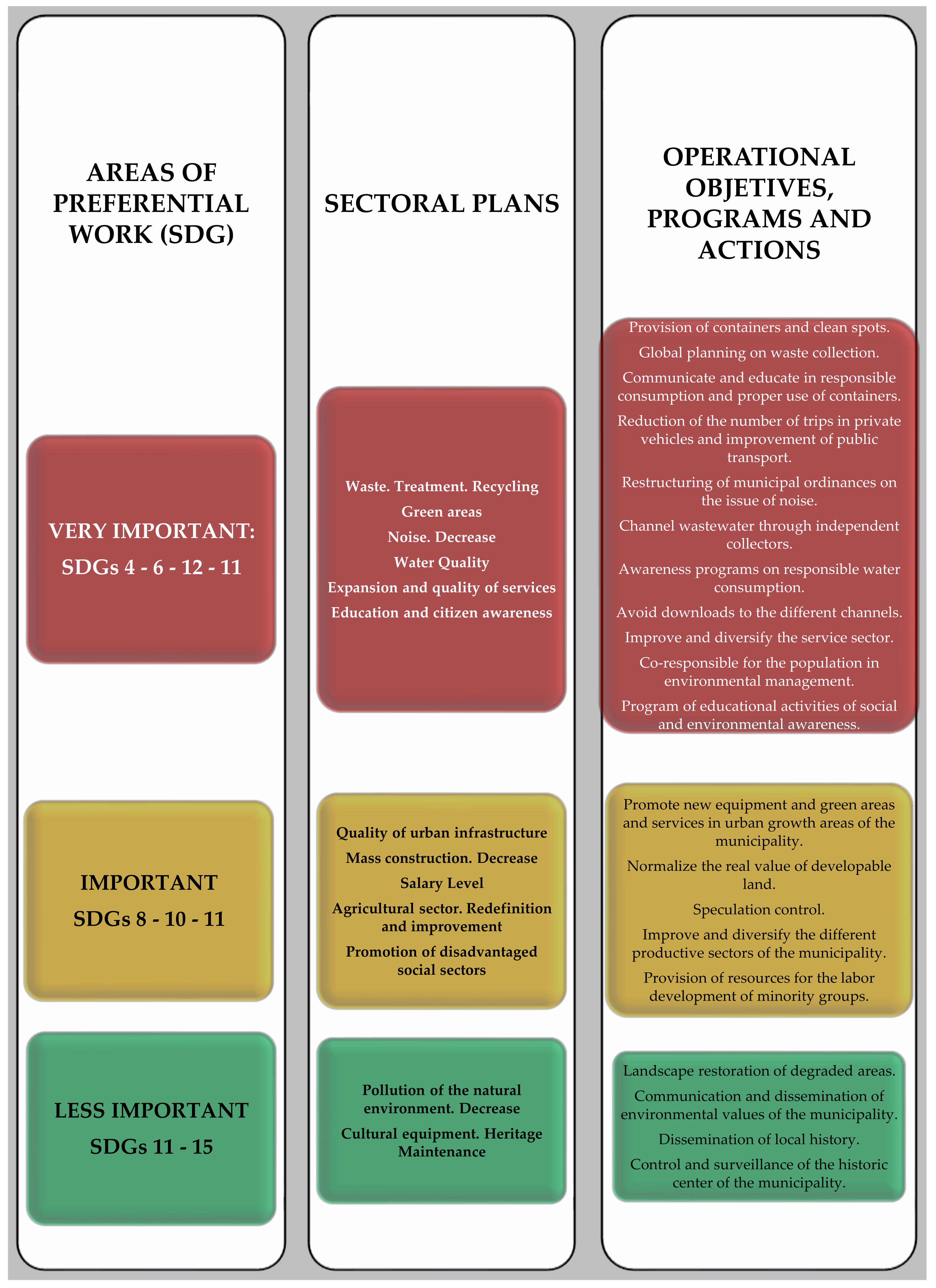
| Aims of Research | Research Questions (RQs) |
|---|---|
|
|
| Aims of Case Study | Research Questions of Case Study (CS) |
|
|
| Strategy | Objectives | Description | Use (Phase) |
|---|---|---|---|
| Citizen opinion questionnaire |
| Section 1: Environmental situation of the municipality. Item 1. What do you think are the most important environmental problems in your municipality? Item 2. Which of the following things do the neighbors of your town and which do you usually do? Item 3. What is the current situation of different aspects of your municipality? Section 2: Local environmental management in the municipality Item 4. What degree of responsibility do the different social groups have in the protection of the environment and in the socioeconomic improvement of the municipality? Item 5. You indicate the order of importance of the following solutions linked to the improvement of the environmental management of your municipality. Item 6. What do you think will improve the local sustainable development agenda in your town? Item 7. Which sector should be further developed with the realization of the local sustainable development agenda for your people to improve? Item 8. How far would you be willing to get involved so that improvement actions were carried out? Item criterion: Municipal environmental situation (in general) |
|
| Monitoring commission |
| A control and evaluation body of the local environmental management process has been created. There have been different control sessions to ensure compliance with the actions. Representatives of the different social groups in the municipalities studied participate in this commission. In this commission, issues relate to the following:
| It has been carried out during the diagnostic phase owing to the relevance of this body throughout the process. |
| Discussion groups/citizen participation forums |
|
| At the end of the diagnostic phase and beginning of phase 2 (design of indicators): citizens contribute to the consensual definition of indicators and action strategies from the results obtained in this initial diagnosis. |
| Letter to municipal political representatives |
| Taking advantage of the Christmas season, an activity has been developed, with the elementary courses, entitled “Letter to municipal representatives” to reflect the situation of the municipality from the point of view of children. |
|
| SWOT TECHNIQUE‰(Strengths—Weaknesses—Opportunities—Threats) |
|
| Transversal action: diagnostic phase, criteria and indicators design phase, and action plan design phase: the research team with a heterogeneous work group formed by process participants identifies these elements to implement the action plan. |
| Citizen Opinion Questionnaire (Sub-Total N = 507) | ||||||||||
|---|---|---|---|---|---|---|---|---|---|---|
| Study level | No studies | 5 | Current activity | Student | 424 | |||||
| Primary studies | 51 | Employee | 54 | |||||||
| Secondary studies | 432 | Unemployed | 14 | |||||||
| University studies | 19 | Others | 15 | |||||||
| Age | Less than 15 | 193 | Professional activity | Student | 421 | |||||
| 15–25 | 239 | Services and culture | 25 | |||||||
| 26–35 | 24 | Housewife | 24 | |||||||
| 36–45 | 34 | Industry | 14 | |||||||
| 46–55 | 10 | Retired | 7 | |||||||
| 56–65 | 3 | Official | 9 | |||||||
| More than 65 | 4 | Others | 5 | |||||||
| Gender | Women | 257 | Non-official executives | 2 | ||||||
| Men | 250 | |||||||||
| Monitoring Commission (Sub-Total N = 14) | ||||||||||
| 1 representative of farmers and livestock. | 1 representative of the women’s associations. | |||||||||
| 1 representative of sports and cultural associations. | 1 representative of shopkeeper associations. | |||||||||
| 1 representative of youths | 1 representative of retirees and pensioners. | |||||||||
| 1 representative of the neighbourhood associations. | 1 representative of the parents’ associations. | |||||||||
| 1 representative of environmental associations. | 1 representative of teacher of the educational centres. | |||||||||
| 1 repres. with recognized prestige in environment/university or research institute. 3 repres. of the political groups with representation in the town council | ||||||||||
| Discussion Groups (Subtotal N = 30) | ||||||||||
| Concillors: 4 | Technicians: 5 | Farmers: 6 | Women Association: 6 | Youth: 9 | ||||||
| Forums 1 & 2 (Subtotal N = 49) | ||||||||||
| Forum 1 (N = 23) | Forum 2 (N = 26) | |||||||||
| ||||||||||
| Letter to Municipal Political Representatives (Primary education students) (Subtotal N = 366) | ||||||||||
| TOTAL SAMPLE N = 966 | ||||||||||
| Instrument | Value α de Cronbach | Elements/Subitems | Sections of Items |
|---|---|---|---|
| Citizen opinion questionnaire | 0.79 | 21 | Environmental problems (item 1) |
| 0.73 | 22 | Things that the residents of the town do (item 2) | |
| 0.77 | 8 | Responsibility of social groups (item 3) | |
| 0.88 | 24 | Current situation of the municipality (item 4) | |
| 0.80 | 9 | What can improve participatory local environmental management in your town (item 7) | |
| 0.70 | 8 | Sector to be developed with this management model (item 8) | |
| 0.70 | 5 | Global claims (item 10) |
| KMO and Barlett Test (Question:Environment Problems) | ||
|---|---|---|
| Kaiser–Meyer–Olkin sample adequacy measure | 0.814 | |
| Bartlett’s sphericity test | Chi-square approximate | 164.70 |
| gl | 210 | |
| Sig. | 0.00 | |
| Λ Total | 2.29 | 2.25 | 2.02 | 1.87 | 1.67 | 48.24% |
| % variance | 10.94 | 10.75 | 9.64 | 8.94 | 7.96 | |
| % accumulated | 10.94 | 21.69 | 31.33 | 40.28 | 48.24 |
| Matrix of Rotated Components (a) “Environmental Issues” | Components | |||||
|---|---|---|---|---|---|---|
| 1 | 2 | 3 | 4 | 5 | Communalities | |
| FACTOR 1. Environmental-context problem | ||||||
| Lack of care and cleanliness of the environment | 0.73 | 0.61 | ||||
| Pollution rivers and vegetation and forest areas | 0.79 | 0.67 | ||||
| Loss of landscape and agricultural land | 0.44 | 0.38 | ||||
| Discharge of illegal taste on the outskirts of the municipality | 0.63 | 0.45 | ||||
| FACTOR 2. Labour problem | ||||||
| Lack of stable work | 0.77 | 0.61 | ||||
| Jobs that require low training and qualification | 0.57 | 0.43 | ||||
| Low salaries | 0.71 | 0.57 | ||||
| High number of unemployed | 0.69 | 0.61 | ||||
| FACTOR 3. Executive-legislative problem | ||||||
| Lack of communication between municipal political representatives: put political interests before social needs | 0.63 | 0.60 | ||||
| Poor coordination between town council technicians | 0.67 | 0.59 | ||||
| Urban growth | 0.54 | 0.37 | ||||
| Lack of urban planning | 0.63 | 0.52 | ||||
| FACTOR 4. Normative-educational problem | ||||||
| Lack of green areas | 0.32 | 0.23 | ||||
| Lack of awareness towards environmental problems | 0.73 | 0.56 | ||||
| Lack of constant training that makes people care for and respect their environment | 0.72 | 0.56 | ||||
| Weak legislation in environment that allows the guilty get through ‘in good shape’ | 0.51 | 0.36 | ||||
| FACTOR 5. Technical-environmental problem | ||||||
| Recycling waste | 0.55 | 0.39 | ||||
| Existence of very loud and annoying noises | 0.64 | 0.54 | ||||
| The passage of so many vehicles through the town center | 0.58 | 0.41 | ||||
| Lack of bins and containers | 0.44 | 0.43 | ||||
| Misuse of containers and bins | 0.26 | 0.14 | ||||
| Strategy | Decisions Achieved |
|---|---|
| Creation of a newsletter |
|
| Logo design that identifies this local management model |
|
| Website |
|
| Discussion Group: Councillors and Technicians | ||
|---|---|---|
| Importance Level | Area | Problems |
| Very important | Recycling and selective collection of rubbish. Container use |
|
| Optimization and expansion of green areas |
| |
| Noise |
| |
| Water Quality |
| |
| Citizen awareness |
| |
| Important | Development of the women’ sector |
|
| Town planning |
| |
| Space adaptation |
| |
| Citizen security |
| |
| Cleaning |
| |
| Population density |
| |
| Sector involvement |
| |
| Training and employment |
| |
| Health |
| |
| Discussion Group: Farmers | ||
|---|---|---|
| Importance Level | Area | Problems |
| Very important | Costs |
|
| Water |
| |
| The product |
| |
| The job |
| |
| Administration support |
| |
| Important | External variables |
|
| Discussion Group: Women | ||
|---|---|---|
| Importance Level | Area | Problems |
| Very important | Citizen awareness |
|
| Citizen security |
| |
| Development of the women’s sector |
| |
| Recycling and selective collection of rubbish. Containers use |
| |
| Important | Optimization and expansion of green areas |
|
| Town planning |
| |
| Cleaning |
| |
| Economy |
| |
| Discussion Group: Youth | ||
|---|---|---|
| Importance Level | Area | Problems |
| Very important | Services |
|
| Citizen security |
| |
| Culture and education |
| |
| Important | Optimization and expansion of green areas |
|
| Water quality |
| |
| Citizen Participation Forum | ||
|---|---|---|
| Importance Level | Area | Problems |
| Very important | Recycling: use of bins |
|
| Existence of noise |
| |
| Important | Lack of green areas and natural environment |
|
| Education and environmental awareness |
| |
| Less important | Care, cleanliness, and respect for the environment |
|
| Waste |
| |
| Others |
| |
| Letter to Municipal Political Representatives | ||||
|---|---|---|---|---|
| Importance Level | Area | Problems | No. Passages | % |
| Very important | Services | (A) Public Services | 577 | 40% |
| 1. Infrastructures and equipment | 443 | |||
| 2. Quality and improvement of services | 114 | |||
| 3. Social services | 12 | |||
| 4. Citizen security | 8 | |||
| (B) Private Services | 169 | |||
| TOTAL | 746 | |||
| Leisure | (A) Equipment | 374 | 21% | |
| (B) Activities | 16 | |||
| TOTAL | 390 | |||
| Important | Environment | (A) Pollution and cleaning | 124 | 13% |
| (B) Recycling | 76 | |||
| (C) Traffic | 39 | |||
| (D) Water | 17 | |||
| TOTAL | 256 | |||
| Town planning | (A) Job | 179 | 12% | |
| (B) Living place | 57 | |||
| TOTAL | 236 | |||
| Civic education | (A) Pro-social behaviors | 67 | 8% | |
| (B) Pro-environmental behaviors | 49 | |||
| (C) Pro-social attitudes | 42 | |||
| TOTAL | 158 | |||
| Less important | Natural environment and green areas | TOTAL | 102 | 5% |
| Employment and job stability | TOTAL | 8 | 0.8% | |
| Cultural heritage | TOTAL | 7 | 0.2% | |
© 2020 by the authors. Licensee MDPI, Basel, Switzerland. This article is an open access article distributed under the terms and conditions of the Creative Commons Attribution (CC BY) license (http://creativecommons.org/licenses/by/4.0/).
Share and Cite
Poza-Vilches, M.d.F.; Gutiérrez-Pérez, J.; Pozo-Llorente, M.T. Quality Criteria to Evaluate Performance and Scope of 2030 Agenda in Metropolitan Areas: Case Study on Strategic Planning of Environmental Municipality Management. Int. J. Environ. Res. Public Health 2020, 17, 419. https://doi.org/10.3390/ijerph17020419
Poza-Vilches MdF, Gutiérrez-Pérez J, Pozo-Llorente MT. Quality Criteria to Evaluate Performance and Scope of 2030 Agenda in Metropolitan Areas: Case Study on Strategic Planning of Environmental Municipality Management. International Journal of Environmental Research and Public Health. 2020; 17(2):419. https://doi.org/10.3390/ijerph17020419
Chicago/Turabian StylePoza-Vilches, María de Fátima, José Gutiérrez-Pérez, and María Teresa Pozo-Llorente. 2020. "Quality Criteria to Evaluate Performance and Scope of 2030 Agenda in Metropolitan Areas: Case Study on Strategic Planning of Environmental Municipality Management" International Journal of Environmental Research and Public Health 17, no. 2: 419. https://doi.org/10.3390/ijerph17020419
APA StylePoza-Vilches, M. d. F., Gutiérrez-Pérez, J., & Pozo-Llorente, M. T. (2020). Quality Criteria to Evaluate Performance and Scope of 2030 Agenda in Metropolitan Areas: Case Study on Strategic Planning of Environmental Municipality Management. International Journal of Environmental Research and Public Health, 17(2), 419. https://doi.org/10.3390/ijerph17020419






